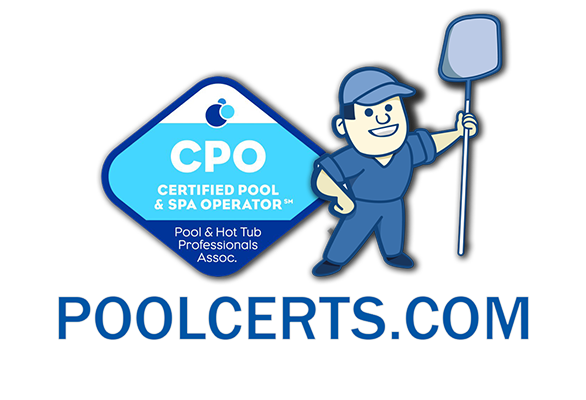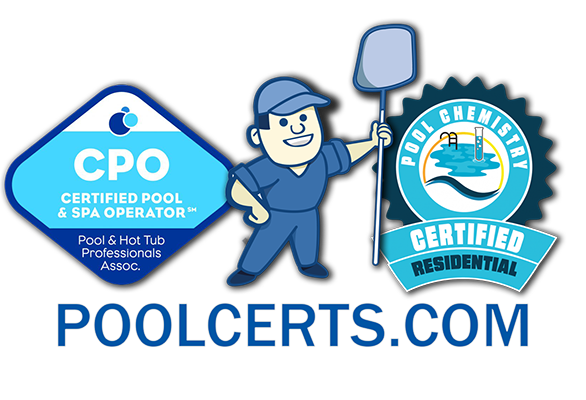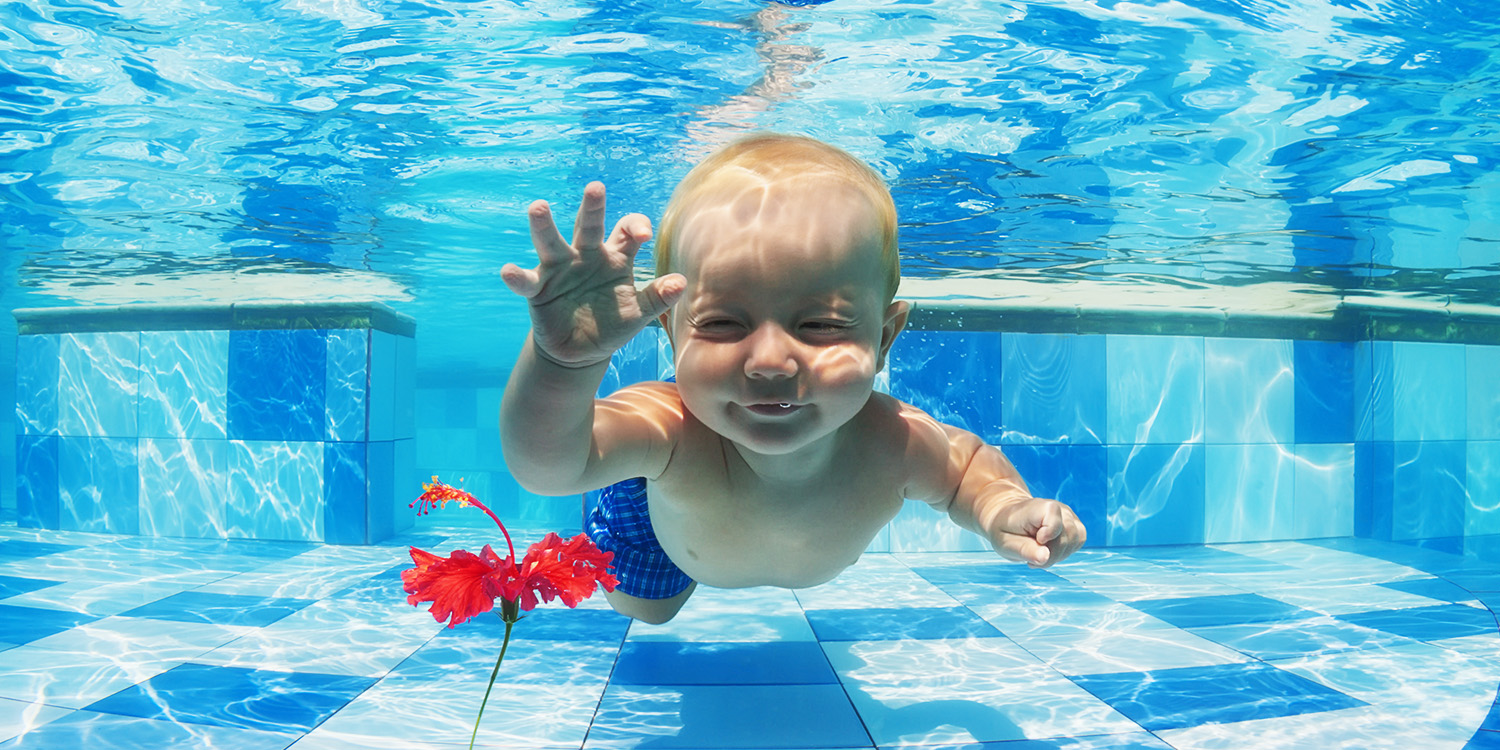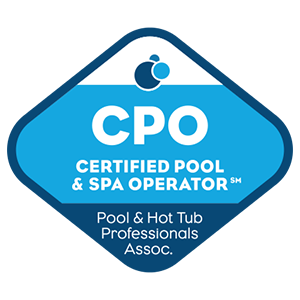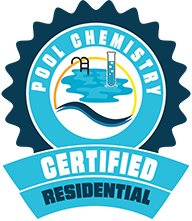Start Today!!!
98% Overall Pass Rates!
OFFICIAL Certification on the SAME DAY!
Lowest Price Guaranteed!
Day, Evening, and Weekend Classes EVERY WEEK!
APPROVED Pool Operator Certification in ALL 50 States!
FAIL? NO STRESS!!! (3 Test Attempts included - I will get you there!!!)
Complete The Online Course
Attend Zoom Class
Take the Exam
CPO Certification, a Comprehensive Guide
The Need for Certified Pool Operators
Commercial Pool Management Requirements
The Importance of CPO Certification
Obtaining your CPO Certification is vital in understanding regulatory compliance, insurance requirements, and all knowledge related to the management of an aquatic facility. In the case of regulatory compliance, a good relationship with the local health department inspector is imperative to the daily operation. This means that the facility is properly managed and prepared at any time for a regulatory inspection which could include the following:
- Free chlorine or total bromine levels
- pH reading
- Proper circulation and flow
- Main drain placement and proper drain covers
- Water temperature
- Proper barriers
- Self-closing and self-latching gates
- Signage
- Americans with disability regulations
The primary responsibility of a manager is to be able to lead through management functions such as:
- Planning
- Organizing
- Leading
- Controlling
Planning has to do with the proficient ability to forecast programs, schedules, and budgets. Organizing is being able to identify and arrange work and delegate responsibilities while building a management structure. Leading is the proactive ability to direct staff to accomplish the task effectively, make good decisions, and hire the right people for the job. Controlling means ensuring standards are in place being measured, evaluated, and corrected if necessary.
Another important aspect for the commercial pool operator is understanding the importance of risk management, which incorporates all of the following:
- Negligence
- Standard of Care
- Duty of Care
- Record Keeping
Negligence is ignoring any maintenance issue that can lead to the injury of a patron or employee or damage to the facility. To avoid negligence a standard of care must be clearly stated and shown. Duty of care is encouraging employees to treat the facility with the greatest care and responsibility for the safety of users and fellow employees. All of this information is in the Commercial Pool Operator CPO Certification course.
Other important subjects covered in the CPO Certification course include:
- Water Chemistry
- Filtration and Circulation
- Facility Maintenance
- Operations and Safety
- Health Codes
- Essential Calculations
The initial CPO Certification course is an intensive 14-16 hour course taught by a Pool Hot Tub Alliance PHTA certified instructor. The course can also be taken online in eight sessions that cover all of the 18 chapters of the Pool and Spa Handbook. Everything you need for the course is provided in the handbook and instructional materials.
Water Chemistry
As a Certified Pool Operator CPO, the primary responsibility of any owner or manager is safety. One of the most vital areas for concern when it comes to human safety is water. Besides possible physical threats of drowning injuries, there are also threats of diseases from bacteria, viruses, and protozoa in the water. A CPO pool operator is knowledgeable of the potential threats and has a good understanding of the use of sanitizers that can inactivate harmful germs and ensure the quality of the water is safe, clean, and clear for all swimmers. A CPO Certification course provides detail in the areas of:
- Pool Water Contamination
- Disinfection
- Water Balance
- Pool and Spa Water Problems
- Chemical Testing
- Chemical Feed and Control
Disinfection is the ability of sanitizers when used properly to inactivate and remove disease-producing microorganisms from the water and provide a safe swimming environment for patrons. You will learn how to accomplish effective disinfection and proper oxidation in the CPO Certification course. Types of chlorine and other disinfectants are covered in the course. Factors to consider when choosing a disinfectant program also are in the course. This includes:
- Water Temperature
- Swimmer Load
- Indoor or Outdoor Pools
- Facility type: Pool, Spa, Waterpark, Therapy
- Source Water Chemistry
- Chemical Storage
- Maintenance Concerns
- Codes and Regulations
All or either one of the above can dictate how the water is managed and what is the best system of disinfection. These subjects are covered in detail in the CPO Certification course. Pool Operators who have responsibility for water chemistry will benefit from all of this impactful information.
Water balance is the secret to good management of the pool. Every operator must have an understanding of water balance. The CPO Certification course will reveal the nature of water as a universal solvent. How the balance of water can have both an effect on users of the pool as well as the equipment and facility. Total Alkalinity, pH, Calcium Hardness, and Total Dissolved Solids TDS are all covered. Also, there are practical exercises that explain and help students in being able to determine the Langelier Saturation Index LSI. These practices will give students the ability to understand how the LSI determines the corrosiveness or scaling potentials of the pool water. Students also will go through examples of how to fix corrosive or scale-forming water problems by adjusting the LSI.
Properly dosing chemicals to address pool and spa water problems is covered in the CPO Certification course. Certified Pool and spa Operators will be provided a manual formula for determining the correct amount of chemicals to make proper adjustments. A simple system allows students to determine the exact amount of chemicals no matter the size or gallonage of the pool. Solutions for common pool problems such as algae, stains, scale, and cloudy water are also covered in this section as well and will prove invaluable to a CPO Certification student.
Testing
Public pool waters can be reactive environments in which conditions can rapidly change. Therefore, a proper understanding of correct chemical testing is essential. Correct testing serves to validate the quality of pool or spa water. All types of pool water tests are covered for the CPO Certification students. This includes:
- Colorimetric
- Titrimetric
- Turbidimetric
- Electronic
The CPO Certification class provides a very comprehensive explanation of proper testing and how to recognize and solve false test results. Oxidation Reduction Potential ORP Sensors along with other test methods like cyanuric acid CYA, Metals, Phosphates, Nitrates, and more all covered in the testing chapter.
Clear and Concise Training on VGB
Indoor Air Quality
Public Spa Operations
One of the most engaging sessions of the CPO Certification course is that of the Spa & Therapy Operations. In this section, the major differences between pool water and that of maintaining spa water are explained. Safe use guidelines for public spas are defined and include:
- Proper signage
- Timers and emergency switches
- How to recognize the symptoms of hyperthermia
- Main drain compliance VGB
- Hot Water Diseases
- Proper filtration and turnover
A spa is not a tiny swimming pool and this chapter vividly explains the problems that may occur due to the higher temperatures and increased evaporation of a spa. This chapter will clarify the need for increased sanitation and oxidation along with regular draining needed to ensure safe water in a public spa.
Elevate Your Knowledge and Professionalism with the CPO Certification Course
The student who participates in a CPO class will come away with a workable knowledge of many subjects which also include:
- Facility Safety
- Proper Record Keeping
- Maintenance Systems
- Troubleshooting
- Facility and Design
The course also offers extensive references and information on preventative maintenance, daily open and close checklists, chemical logs, inspection sheets, and water chemistry adjustment guides.
Registering and participating in the CPO course will provide the student with comprehensive knowledge of the complete responsibilities of operating a commercial pool and spa facility. If the job of an aquatics director or pool operator is something you are pursuing, the CPO course is the best and most complete education you can get to launch you towards your goal.
